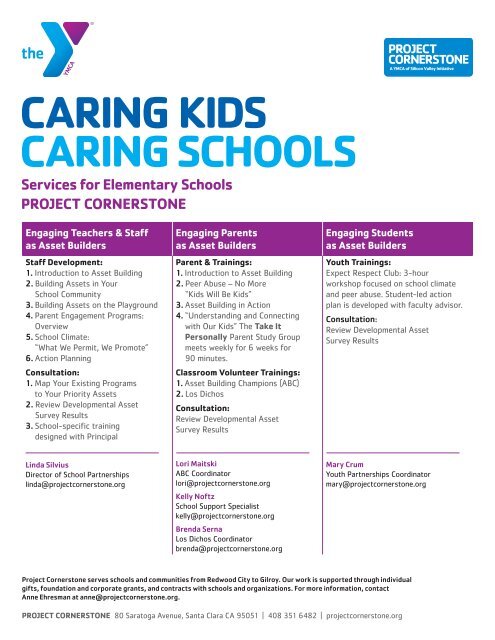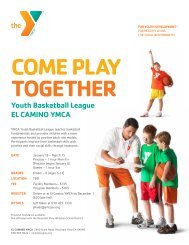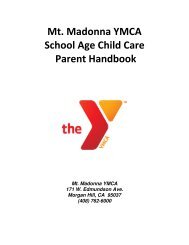Elementary Schools - Project Cornerstone
Elementary Schools - Project Cornerstone
Elementary Schools - Project Cornerstone
You also want an ePaper? Increase the reach of your titles
YUMPU automatically turns print PDFs into web optimized ePapers that Google loves.
CARING KIDSCARING SCHOOLSServices for <strong>Elementary</strong> <strong>Schools</strong>PROJECT CORNERSTONEEngaging Teachers & Staffas Asset BuildersStaff Development:1. Introduction to Asset Building2. Building Assets in YourSchool Community3. Building Assets on the Playground4. Parent Engagement Programs:Overview5. School Climate:“What We Permit, We Promote”6. Action PlanningConsultation:1. Map Your Existing Programsto Your Priority Assets2. Review Developmental AssetSurvey Results3. School-specific trainingdesigned with PrincipalEngaging Parentsas Asset BuildersParent & Trainings:1. Introduction to Asset Building2. Peer Abuse – No More“Kids Will Be Kids”3. Asset Building in Action4. “Understanding and Connectingwith Our Kids” The Take ItPersonally Parent Study Groupmeets weekly for 6 weeks for90 minutes.Classroom Volunteer Trainings:1. Asset Building Champions (ABC)2. Los DichosConsultation:Review Developmental AssetSurvey ResultsEngaging Studentsas Asset BuildersYouth Trainings:Expect Respect Club: 3-hourworkshop focused on school climateand peer abuse. Student-led actionplan is developed with faculty advisor.Consultation:Review Developmental AssetSurvey ResultsLinda SilviusDirector of School Partnershipslinda@projectcornerstone.orgLori MaitskiABC Coordinatorlori@projectcornerstone.orgKelly NoftzSchool Support Specialistkelly@projectcornerstone.orgBrenda SernaLos Dichos Coordinatorbrenda@projectcornerstone.orgMary CrumYouth Partnerships Coordinatormary@projectcornerstone.org<strong>Project</strong> <strong>Cornerstone</strong> serves schools and communities from Redwood City to Gilroy. Our work is supported through individualgifts, foundation and corporate grants, and contracts with schools and organizations. For more information, contactAnne Ehresman at anne@projectcornerstone.org.<strong>Project</strong> <strong>Cornerstone</strong> 80 Saratoga Avenue, Santa Clara CA 95051 | 408 351 6482 | projectcornerstone.org
Engaging Teachers and School Staff as Asset BuildersAll school staff – teachers, administrators, and counselors as well as yard supervisors, coaches, bus drivers, custodians,clerical support staff, librarians – have the power to build developmental assets in children and youth. Asset building is anatural fit for any adult in the field of education. <strong>Project</strong> <strong>Cornerstone</strong>’s training with all school staff focuses on specificways in which they have the opportunity to build assets with their students every day.1. Introduction to Asset Building – This presentation introduces participants to Search Institute’s DevelopmentalAsset Framework and their research. The power of assets to prevent children and youth from engaging in riskybehavior as well as the promotion of thriving behaviors is detailed in addition to showing the impact on academicachievement and social/emotional health. The presentation also shares how <strong>Project</strong> <strong>Cornerstone</strong> utilizes thedevelopmental asset model to support school efforts to infuse asset-building into its culture. The overview isapproximately 30 minutes and works well during a regular teacher meeting.2. Building Assets in Your School Community – This presentation details the four primary areas that assets arebuilt in school communities and how they support the Common Core Standards. These include, but are not limitedto 1) positive relationship building, 2) an emotionally safe school environment, 3) programs offered at the schoolsite and 4) day-to-day strength-based practice of teachers and other adults on campus. This training includesexperiential based learning activities as well as direct presentation materials. Staff will have a tool-box of assetbuilding ideas by the end of the training which they can utilize with students immediately. This session is 60-90minutes, and can be combined with the Introduction to Asset Building for staff development days.3. Building Assets on the Playground – Unsupervised time on an elementary school playground is “primetime” fornegative behaviors to surface between students. Whether serious peer abuse/bullying behavior between studentsor a single student behaving in inappropriate ways, it is the leading time in any school day for discipline problemsto erupt. This training gives noon duty teachers and parent volunteers new strategies to approach this period in theday from an asset-building perspective rather than the more traditional “yard police”. The training is 60 minutes andis appropriate for any adult with the responsibility of supervising students during their free time.4. Parent Engagement Programs: Overview – This short (15–30 minute) informational training focuses on thetwo <strong>Project</strong> <strong>Cornerstone</strong> parent engagement programs that involve parents reading children’s literature andteaching a short lesson in the classroom each month. These short presentations can be woven easily into aregular staff meeting and are usually done by the coordinators of the specific program either ABC or Los Dichos.5. School Climate: “What We Permit, We Promote” – Wherever it happens, bullying behavior is hurtful andcan have a dramatic negative impact on student success in school. <strong>Project</strong> <strong>Cornerstone</strong> offers a staff developmentopportunity in this critical area for all credentialed and classified staff, as well as volunteers. Training is between60 and 90 minutes.6. Action Planning – Whether on a school-wide basis or grade level teams, action planning can be facilitated withschool staff choosing a number of the assets they would like to focus on for the school year. Staff might choose tofocus on assets which have shown to improve school climate or academic achievement, or perhaps look at “serviceto others” as a strategy to build multiple assets. These strategies are mapped with the 21 st Century Learning Skillsto ensure alignment with school-site and district priorities. This session is approximately 60 minutesTo schedule any of the above trainings for staff development or consultation, contactLinda Silvius at linda@projectcornerstone.orgIf interested in Parent Engagement Programs, contact the following:ABC Program Coordinator, Lori Maitski at lori@projectcornerstone.orgLos Dichos Program Coordinator, Brenda Serna at brenda@projectcornerstone.org
Engaging Parents as Asset BuildersPARENT TRAININGSAll parents and school volunteers can benefit from the three main training programs <strong>Project</strong> <strong>Cornerstone</strong> offers to schoolpartners. They do not need to be taken in the order they are listed. Numbers 1–3 can be presented for a general “parenteducation” program or for a specific group such as a PTA, ELAC or a Principal Coffee. Number 4 is a six-week group andcan be scheduled at school sites. Note: All parent trainings are available in Spanish and English.1. Introduction to Asset Building – This presentation introduces parents to Search Institute’s DevelopmentalAsset Framework and their research. The power of assets to prevent children and youth from engaging in riskybehavior as well as the promotion of thriving behaviors is detailed in addition to showing the impact on academicachievement and social/emotional health. The presentation also shares how <strong>Project</strong> <strong>Cornerstone</strong> utilizes thedevelopmental asset model to support the needs of parents and families in this all important work. The overviewis approximately 30 minutes in length.2. Peer Abuse No More: “Kids Will Be Kids” – This presentation raises awareness of the problems of bullying andpeer abuse in school settings, as well as the issue of cyberbulllying. This presentation also shares techniques foradults to help ensure that their student will not be the target of bullying behaviors. The title refers to the old adagethat we don’t really need to worry about kids bullying other kids – “it’s been happening forever – no big deal.”This training discusses why that old adage needs to be retired, as we work with our young people to create a“new normal” of acceptable behavior. This session is approximately 60 minutes.3. Asset Building In Action – An in-depth look at the heart of asset development in communities. It explores the needfor all adults to once again step up to the task of sharing responsibility for the well-being of all children and youth.It is an excellent choice to train all school volunteers in the basic tenants of developmental assets and the importantrole that each and every adult plays in the life of a child. Parents and school volunteers leave this session feelingboth a stronger sense of community, and a renewed sense of the number of caring adults in the lives of theirchildren. This session is approximately 60 minutes.4. “Understanding and Connecting with Our Kids” Take It Personally Parent Study Group – In this six sessionstudy group, parents learn about the eight categories of developmental assets, examine and reflect upon theiropportunities to build assets with children and youth, as well as develop new skills to be more intentional assetbuilders with all children. By the end of the study group, participants will take their role as asset builders morepersonally as they begin to act on their new knowledge. This group is available in English, Spanish and Vietnamese.There is a nominal fee per participant for the workshop.To schedule any of the above presentations or the 6-week parent group, contactLinda Silvius at linda@projectcornerstone.org
CLASSROOM VOLUNTEER TRAINING1. Asset Building Champions (ABC) – Parents who volunteer for the ABC program read children’s books as well as leadclassroom activities and discussions on a monthly basis. The curriculum focuses on building developmental assets inthe areas of support, empowerment, boundaries and expectations, positive values, social competencies, and positiveidentity. It teaches students important life skills such as decision making, peaceful conflict resolution, and interpersonalskills. It covers all areas of peer abuse and gives students the skills to avoid being the target of bullying behavior fromother students. ABC parents teach students how to be UPstanders instead of bystanders in situations of conflict. Inaddition to providing meaningful opportunities for parent engagement and for students to interact with caring adults,the program helps create a common language for behavioral expectations throughout the school. Available for preschoolthrough elementary classrooms.To learn more, contact Lori Maitski at lori@projectcornerstone.org2. Los Dichos de la Casa (Los Dichos) Volunteer – Los Dichos de la Casa (Los Dichos) is a Spanish-language programthat opens new doors for Spanish-speaking parents to support not only their children’s education and development butthat of all children in their community. Each month, Los Dichos volunteers read specially selected bilingual books in theclassroom and lead activities and discussions about topics including Latino heritage, tolerance, family pride, peacefulconflict resolution and other important values. Students develop a sense of positive cultural identity and overall agreater sense of cultural competence and respect for one another.To learn more about this unique program, contact Brenda Serna at brenda@projectcornerstone.org*Note: All volunteers in both ABC and Los Dichos must take either ABC or Los Dichos Assets 101 or the 6-weekTake It Personally parent study group.
Engaging Students as Asset BuildersEXPECT RESPECT WORKSHOP AND CLUBBullying is a significant problem in Silicon Valley schools – according to the California Healthy Kids Survey, 50% ofseventh-graders were verbally harassed in the past 12 months, and 34% of seventh-graders don’t feel safe at school.To empower students to combat bullying and peer abuse, <strong>Project</strong> <strong>Cornerstone</strong> developed the Expect Respectworkshop. Expect Respect helps students from different social groups – including bullies and victims, athletes and“mathletes,” tough kids and cheerleaders, class presidents and class clowns and everyone in between – work togetherto find common ground and create a “new normal” for their school where all students are accepted and supportedby their peers.In Expect Respect, a diverse team of students attends an intensive half-day workshop where they learn about bullying’sserious consequences, how to identify bullying behavior and how to effectively STAND UP to bullies. Then, the teamidentifies the kinds of bullying that take place at their school and creates an action plan to stop bullying and improvethe overall school climate. <strong>Project</strong> <strong>Cornerstone</strong> provides follow-up support and coaching throughout the year tostudents and faculty advisors to help ensure that their action plan is fully implemented.The Expect Respect workshop is aligned with the Olweus research model, with the recommendations of the AmericanAcademy of Pediatrics and the American Academy of Family Physicians for effective bullying prevention programs, andreceived national recognition from Sports Illustrated for helping student take a stand against bullying at their schools.Expect Respect is aligned with and reinforces the curriculum for the ABC program so that students learn and apply thesame vocabulary and concepts. But, the ABC program isn’t a requirement to hold a successful Expect Respect workshopat your school.After the workshop, the students meet twice a month as the Expect Respect Club with the advisor who is a school staffmember. <strong>Schools</strong> are encouraged to invite other students to join the club after the initial workshop. It should be open toall students and not seen as an exclusive group or club. The primary task of the Expect Respect Club is to implement theaction plan they developed at the workshop and to provide school-wide student leadership in the promotion of respectfultreatment of peers and the reduction of bullying. Follow-up support is provided to the school team if needed to helpensure the success of their action plan.To learn more, contact Mary Crum at mary@projectcornerstone.org





